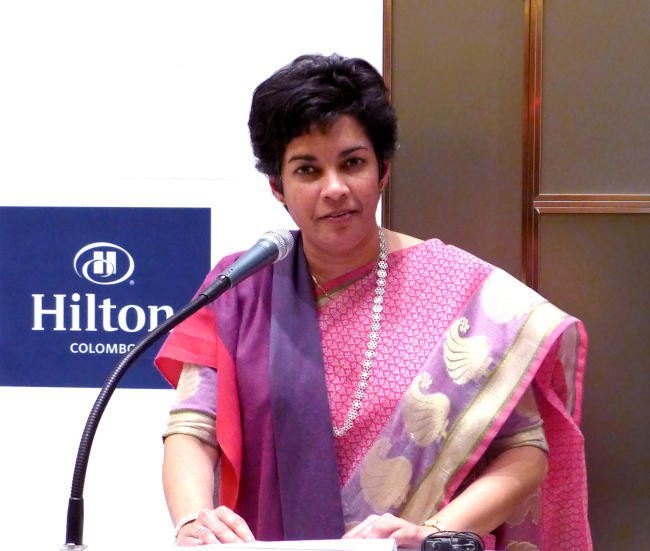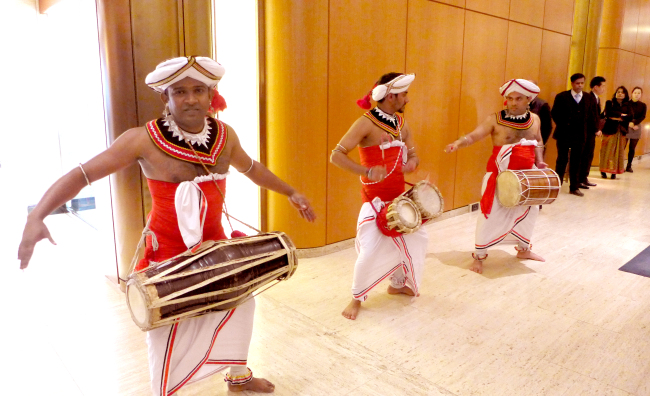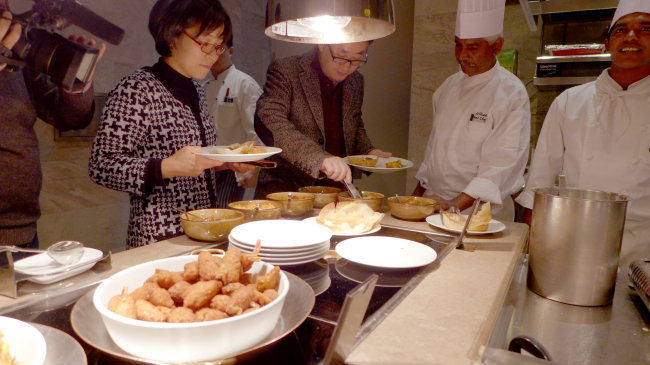Ahead of the 40th anniversary of diplomatic relations with Korea, Sri Lanka is enhancing its partnership with Korea and promoting itself as an attractive investment destination in the Indian Ocean.
The island country has registered annual growth of 6 percent over the last 10 years, and presents itself as a logistics hub linking East Africa, the Middle East, South Asia, Southeast Asia and Northeast Asia.
As the nation aims to shore up foreign investment, boost international trade and switch to a knowledge-based economy, Korea is “a country of prime focus with which to further expand relationships on all fronts,” the country’s top envoy to Korea highlighted last week.
“Sri Lanka is strategically located in the Indian Ocean and growing in the consciousness of Korea for its air lanes and sea lanes,” Manisha Gunasekera, the new Sri Lankan ambassador to Korea, told The Korea Herald in late January.
“In terms of logistics hubs, you have Dubai in the Middle East and Singapore in Southeast Asia, but you have nothing in between. Colombo could be an ideal waypoint for maritime and air trade, commerce and manufacturing.”
The island country has registered annual growth of 6 percent over the last 10 years, and presents itself as a logistics hub linking East Africa, the Middle East, South Asia, Southeast Asia and Northeast Asia.
As the nation aims to shore up foreign investment, boost international trade and switch to a knowledge-based economy, Korea is “a country of prime focus with which to further expand relationships on all fronts,” the country’s top envoy to Korea highlighted last week.
“Sri Lanka is strategically located in the Indian Ocean and growing in the consciousness of Korea for its air lanes and sea lanes,” Manisha Gunasekera, the new Sri Lankan ambassador to Korea, told The Korea Herald in late January.
“In terms of logistics hubs, you have Dubai in the Middle East and Singapore in Southeast Asia, but you have nothing in between. Colombo could be an ideal waypoint for maritime and air trade, commerce and manufacturing.”

Gunasekera, who assumed charge in last September, added that her government had introduced additional deregulation measures to make the investment climate more flexible, including a foreign exchange management bill.
The new national unity government led by President Maithripala Sirisena and Prime Minister Ranil Wickremesinghe came to power last year, after the end of more than three decades of violent conflict with the Liberation Tigers of Tamil Eelam. The militant organization, founded in 1976, had waged secessionist insurgencies to carve out an independent state in northern and eastern Sri Lanka for the Tamil people.
The whole country is now “united and stable,” infrastructure is being developed nationwide and the economy has grown steadily since 2005, according to the ambassador.
“Another important government agenda is to work on reconciling communities over broad areas,” she said. “There is a dialogue with the Tamil parties within the democratic process to bring about comprehensive peace that is acceptable to everyone, and prevent clashes from recurring.”
Sri Lanka and Korea established diplomatic relations in 1977, and the bilateral trade volume has gradually risen to $487 million in 2014. In the first half of last year, two-way trade reached $188 million. The trade balance is heavily in favor of Korea, which exported $155 million and imported $33 million worth of merchandise to and from Sri Lanka. Sri Lanka imports iron and steel, diesel, knitted fabrics and staple fiber products from Korea, among other things.
Sri Lanka’s top export item is apparel ― accounting for 34 percent of total exports to Korea ― followed by Ceylon tea, rubber and rubber-based products, spices, gems, diamonds and jewelry. The country is a large producer of cinnamon, making up over 85 percent of the world’s supply. Potential for more trade exists in information communications technology, business process outsourcing, seafood and fisheries products, flowers, fruit and vegetables, Gunasekera underscored.


According to the diplomatic mission, Korea remains a major source of foreign direct investment in Sri Lanka, with more than 70 companies based in the country creating some 4,000 jobs. The two nations have proposed to establish a joint working group to explore new avenues of enhancing economic cooperation, covering customs, technology transfers, trade barrier elimination, regulations, tourism and investment.
The two countries are members of the Asia-Pacific Trade Agreement ― formerly the Bangkok Agreement ― whose member states encompass 2.5 billion people.
Furthermore, Korea’s Saemaul Undong ― the “New Village Movement” targeting communal agricultural reforms ― has “resonances” with Sri Lanka, the embassy said. The program has been implemented in two model towns with plans for expansion in other regions, to revitalize the rural economy, integrate them with markets, reduce poverty, achieve sustainable farming and ensure food security.
With $430 million in cumulative disbursement, Sri Lanka is the second-highest recipient of official development assistance from Korea, out of 52 developing countries that do so.
There are about 25,000 Sri Lankans living in Korea, mostly contractual workers engaged in manufacturing, construction and fisheries through the Employment Permit System. The embassy pays keen attention to their welfare through regular visits, briefings and consular, cultural and other services, the envoy said.
Over 100 Sri Lankan students are studying in Korea in undergraduate, graduate and doctoral programs, many of them with scholarships granted by the Korean government or private foundations.


On the tourism front, Sri Lanka ― known as “the Pearl of the Indian Ocean” ― offers a “total package,” Gunasekera stressed.
“Sri Lanka is an exotic destination with a lot of wildlife, including over 5,000 elephants that move in herds of up to 80,” he said. “We have pristine beaches all around the island. Tourists can go windsurfing, kitesurfing and whitewater rafting, as well as visit ancient monuments, temples and pagodas from our 2,500 year history.”
The lush tropical island has eight UNESCO World Heritage Sites, 15 national parks, 350 waterfalls, large tea estates and botanical gardens. Korean tourists have risen over threefold since 2010 to nearly 14,400 last year, aided by three direct flights a week between Seoul and Colombo through Korean Air.
To acquaint Koreans with the country’s cuisines, the embassy is hosting a series of promotional events this month, including a food festival at the Millennium Seoul Hilton’s Cafe 395, which runs until Feb. 7. The venue will showcase traditional gastronomies, Ceylon tea and different spices. Two experienced chefs flown in from Hilton Colombo will cook up crab curry, deviled beef and prawns, cashew curry, yellow rice, fish and seafood, cutlets and specialty desserts, among others.
By Joel Lee (joel@heraldcorp.com)


-
Articles by Korea Herald










![[Hello India] Hyundai Motor vows to boost 'clean mobility' in India](http://res.heraldm.com/phpwas/restmb_idxmake.php?idx=644&simg=/content/image/2024/04/25/20240425050672_0.jpg&u=)








